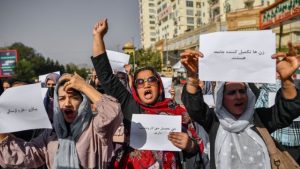Only a few months into Taliban’s rule, the future of Afghan women and girls is in jeopardy.
This article examines how the fight for Afghan girls’ education and freedom intersects with the fight fo justice in Afghanistan, based on in-depth research and in-person interviews in Kabul.
Afghan women have long fought for their rights, envisioning an equitable society for future generations. Thousands of women, including well-known names such as Malala Yousafzai, Noor Jahan Begum, and Makhfi Badakhshi, have fought against the inequalities.
One of the most inspirational figures in course of our struggle is Malalai Maiwandi.
She is one such illustrious example of bravery, sacrifice and courage in the history of Afghanistan. Born in 1861 to a shepherd father, she was only in her teens when she became a martyr.
During the Battle of Maiwand which took place in July 1880, there were several women including Malala who came to the aid of their fellow countrymen. In the battlefield, she charged holding the flag, and as per some accounts she made a flag out of her scarf and sang the famous Tappa (short folk song):
“Ka pa Maiwand ke Shaheed Nashwee. Khodaygo lalia be nangi la de Satama
Ta pa Maiwand ke Zan Shaheed kra. Zo ba soor shall sta pa ziarat oghwarawoma”.
“O my Love! I want you as a martyr in the battle of Maiwand. Otherwise in my whole life, I will consider you, no man of honour.
If you are martyr in Maiwand. I will wear my red scarf at your body”.
These verses motivated the Afghan forces and they regrouped and attacked British forces, routing them. Only a few managed to escape from battlefield. British commanders reportedly said that they lost the war due to Malala; however, she was herself among the martyrs including her fiancé and her father. It is believed that she was due to get married on the same day but instead chose to fight and die. Malalai is remembered as a symbol of courage and bravery.
Even today, Afghan women stand up for their rights, especially their right to education, in the face of the discriminatory restrictions imposed by the Taliban during the first and current occupation of Afghanistan.

During the Taliban’s first government in the 90s , women and girls were excluded from schools and colleges. They were ordered to stay home outside of school and were forbidden to work, study, or engage in other activities outside of school. While all schools were closed, some women took the risk of running secret schools. When the Taliban learned about these schools, not only were the schools closed, but these women were met by severe punishments. Nurses and doctors were allowed to wear a burqa and work in the hospital only if they wore burqas and were accompanied by a male family member.
The 2021 coup, once again brought the hard-won rights and liberties at stake.
The interim government formed by the Taliban announced a group of interim ministers who were all male and mostly former Taliban Soldiers. The Taliban changed the Ministry of Women’s Affairs in Afghanistan to the Ministry of Propagation of Islamic Virtue and the Prevention of Vices.
Taliban continues to discriminate and oppress Afghan women in the name of religion. There is no rationale or religious justification for their behaviour. In reality, true followers of Islam contend that the infringement of women’s rights within the title of religion could be a disregard to God.
The Taliban utilize extraordinary rules of Islam to force rules on ladies and young women. These are not genuine interpretations of Islamic texts.
In Islam, the principle of gender equality is supported by the notion that neither of the sexes is superior. The Quran (5:2) states:
“O people! Fear the wrath of your Lord, who created you from a single soul; Who created another in its likeness as his mate, and from the pair scattered countless men and women across the face of the earth…revere the wombs that bore you, for it is by their sanctity too that you swear your oaths and conclude your contracts with others.”
This verse of the Quran indicates that there is no supremacy of one sex over the other. On this authority, both genders are created from the single soul, with the same human and spiritual nature.
The discrimination shown by the Taliban against women cannot be supported by Islam, despite many members of the Taliban’s claims. There are alternatives that can be fought for so that Afghan women can still receive an education at this time. Education is the most powerful tool for Afghan women to realise their dreams of a better future. Time is running out and the international community must not let them down.
In these dark times, we still witness a large number of educated women taking to the streets and demand the right to continue their education and work. Educated women have never been silent against oppression and continue to defend their rights vehemently.

